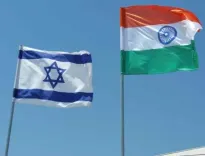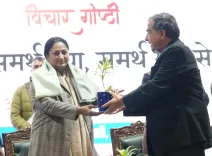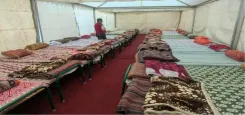What Led to the Surrender of 37 Maoists Before Telangana DGP?

Synopsis
Key Takeaways
- The surrender of 37 Maoists, including key leaders, reflects a shift in the Maoist movement in Telangana.
- The decision was influenced by government appeals for peace and rehabilitation.
- The Telangana Police is committed to supporting the reintegration of surrendered cadres.
- There is a notable decrease in the operational capabilities of the CPI (Maoist).
- Continued pressure from security forces is leading to ideological disillusionment among cadres.
Hyderabad, Nov 22 (NationPress) In a significant setback for the banned CPI (Maoist), a total of 37 underground cadres, including three State Committee Members, surrendered to the Telangana Police on Saturday.
Among them, seven cadres also surrendered eight firearms, which included one AK-47 rifle, two SLRs, four .303 rifles, and one G3 rifle, along with 343 live rounds of various calibres.
The three State Committee Members (SCM) who surrendered include Koyyada Sambaiah alias Azad, Appasi Narayana alias Ramesh from the Telangana State Committee, and Muchaki Somada alias Erra from the Dandakarnya Special Zonal Committee (DKSZC). They surrendered to Director General of Police B. Shivadhar Reddy.
Additionally, three Divisional Committee Members (DVCM), nine Area Committee Members (ACMs), and 22 party members from the CPI (Maoist) organization have rejoined the mainstream.
The decision to surrender was reportedly influenced by sustained pressure from security forces, ideological differences, and internal conflicts within the leadership of the CPI (Maoist). These cadres chose to dissociate from the organization and reintegrate into society with government support.
The DGP mentioned that this surrender aligns with an appeal made by Chief Minister A. Revanth Reddy on October 21, urging members of the CPI (Maoist) to abandon their violent past and engage in developmental activities for the State and its citizens. The surrender reflects a constructive response to this appeal.
Moreover, these individuals have made a conscious decision to abandon extremism and reintegrate into civil life. They expressed a desire to prioritize their health and family, committing to a peaceful, dignified, and law-abiding existence by taking advantage of the rehabilitation measures offered by the Telangana Government.
The surrendered Maoists were given the cash rewards they were entitled to for their rehabilitation. The SCMs carried a reward of Rs 20 lakh each, while DVCMs received Rs 5 lakh, ACMs Rs 4 lakh each, and each party member was entitled to Rs 1 lakh.
According to the guidelines from the Ministry of Home Affairs, additional rewards for surrendering with firearms include Rs 4 lakh for an AK-47, Rs 2 lakh for an SLR, Rs 1 lakh for a .303 Rifle, and Rs 5,000 for a 410 Muskat Rifle.
The total reward amount of Rs 1,41,05,000 was distributed among the 37 cadres through drafts and cheques. They will also receive additional benefits according to the Telangana Government’s rehabilitation policy.
The DGP reiterated the police department's commitment to ensuring all entitled benefits under the rehabilitation policy are promptly provided, enabling these individuals to rebuild their lives with dignity and security.
He deemed the surrender of these Maoists a significant moral victory for the comprehensive strategy implemented by the Telangana Police against the CPI (Maoist).
In total, 465 underground cadres, including two Central Committee Members (CCMs), 11 SCMs, two Divisional Committee Secretaries (DVCS), 11 DVCMs, and 44 ACMs, have surrendered to the Telangana Police in 2025.
The DGP stated that 59 of these underground cadres are native to Telangana, comprising five Central Committee members and 10 State Committee Members. Among these, only two SCMs, one DVCS/DVCM, three ACMs, and two party members are currently active in the Telangana State Committee, while the rest operate in other states, including Chhattisgarh.
He added that the CPI (Maoist) is experiencing a notable decline in both organizational strength and operational capabilities due to sustained pressure from security forces. This has disrupted key networks, reduced mobility, and led to diminishing support bases.
Emerging ideological differences have caused dissatisfaction among cadres regarding the movement's relevance and direction. The disconnect between the leadership's theoretical positions and the harsh ground realities has resulted in disillusionment, particularly among senior members who have spent decades underground.
The situation has been further complicated by internal leadership conflicts and factional disputes, creating mistrust and a lack of strategic clarity. These challenges have weakened organizational cohesion, affected operational decisions, and contributed to increasing frustration among cadres at various levels.
These combined factors have prompted many key functionaries to reconsider their involvement and opt for surrender, seeking a peaceful and dignified life through rehabilitation and reintegration.
The DGP once again called upon all remaining underground cadres of the CPI (Maoist)










